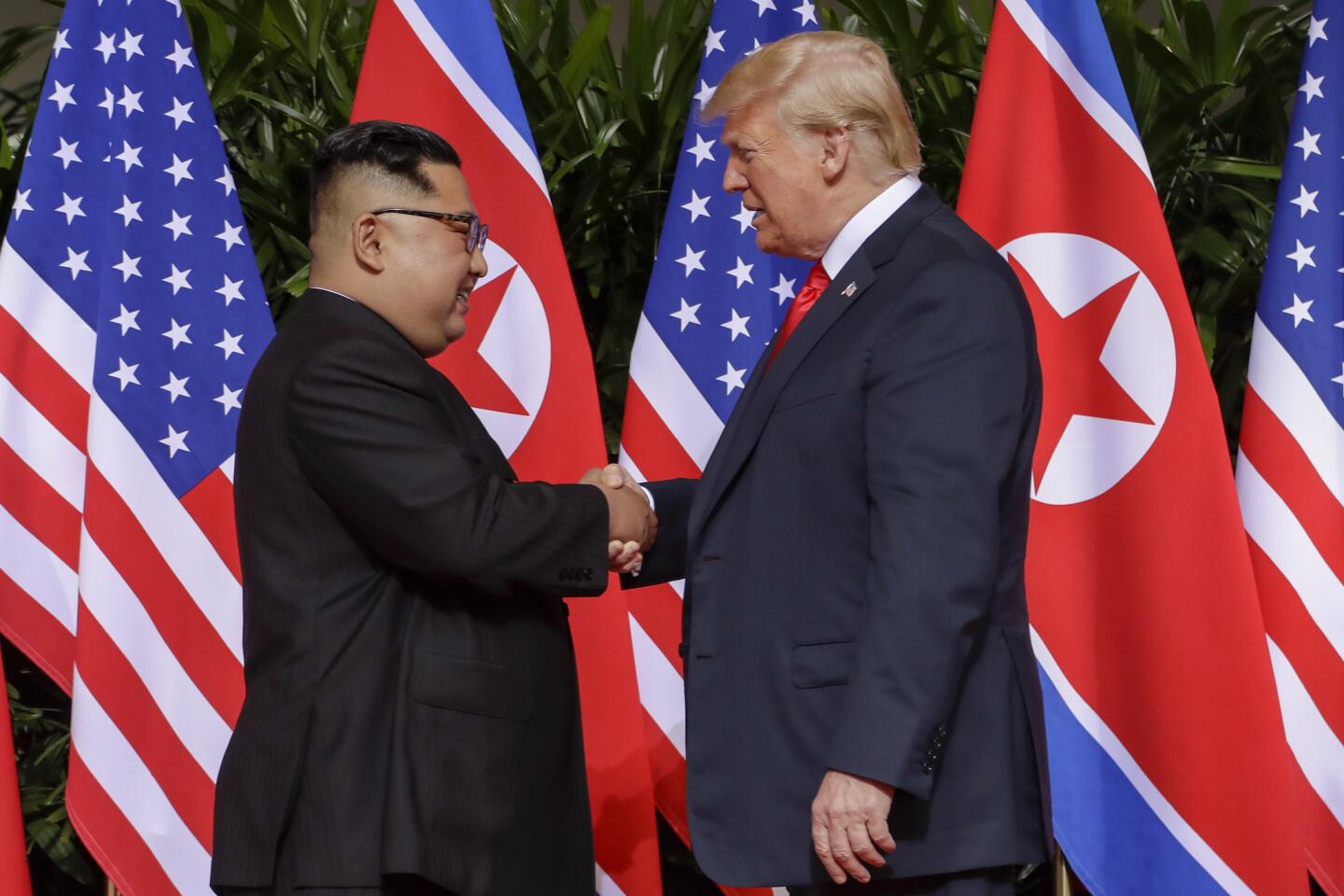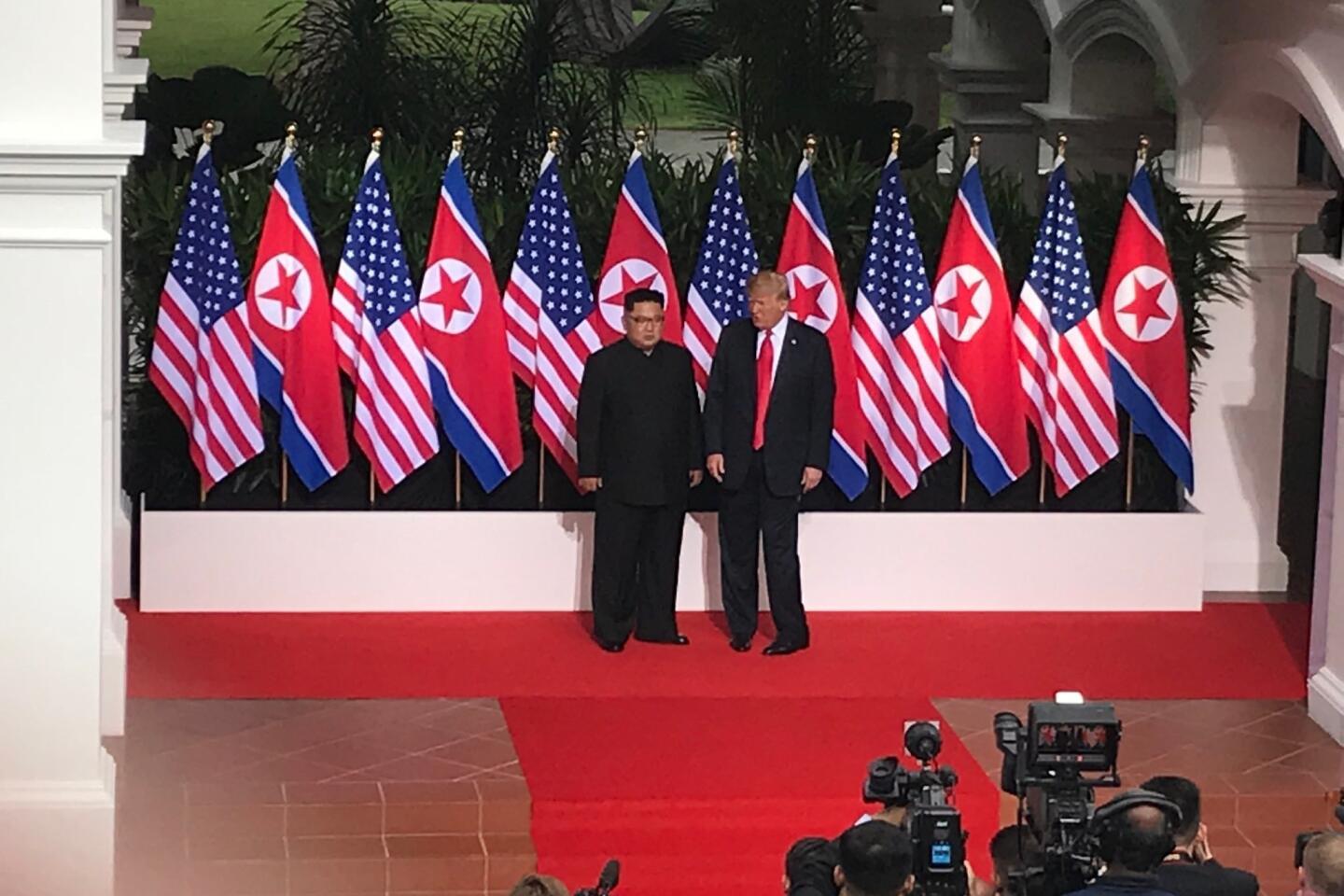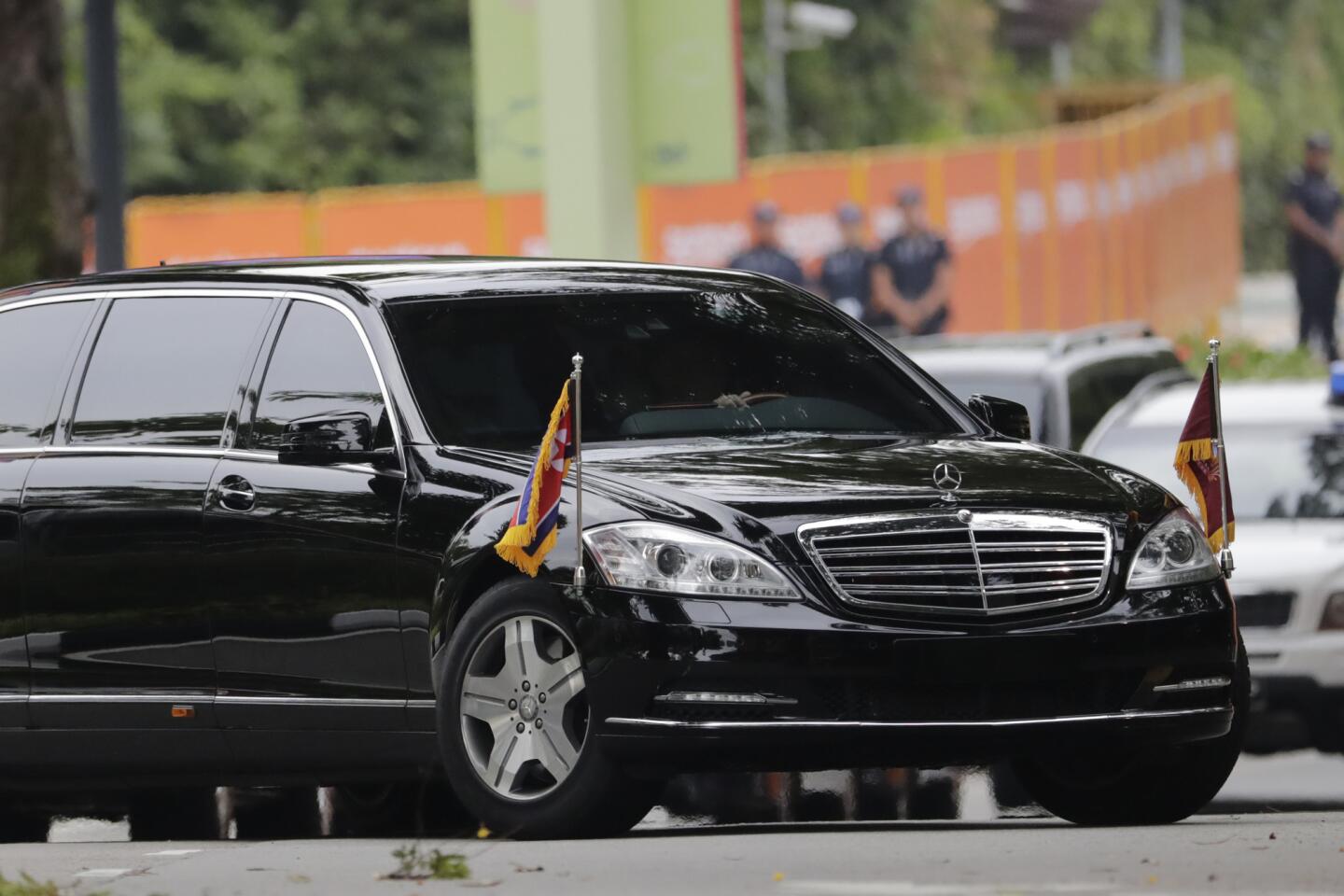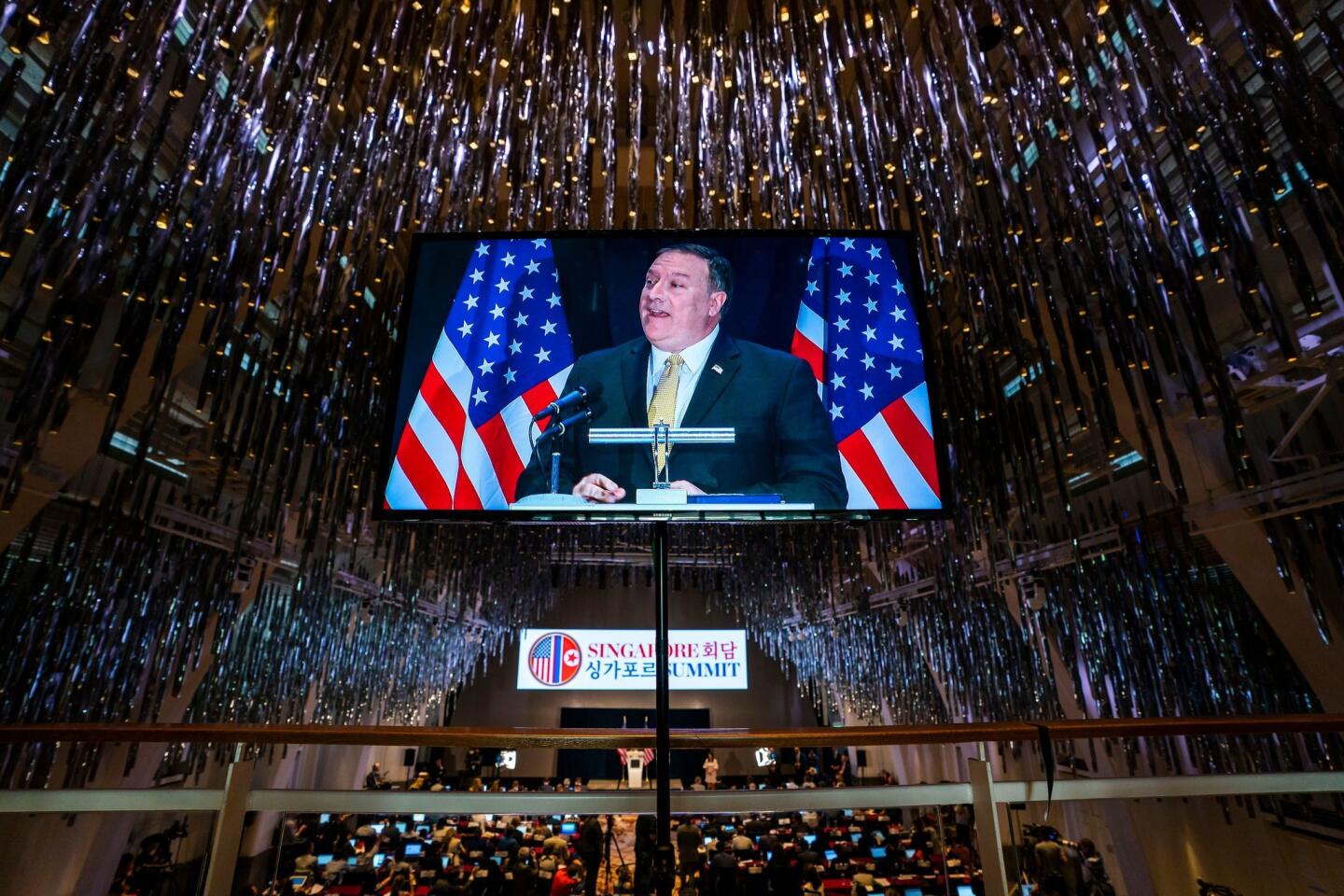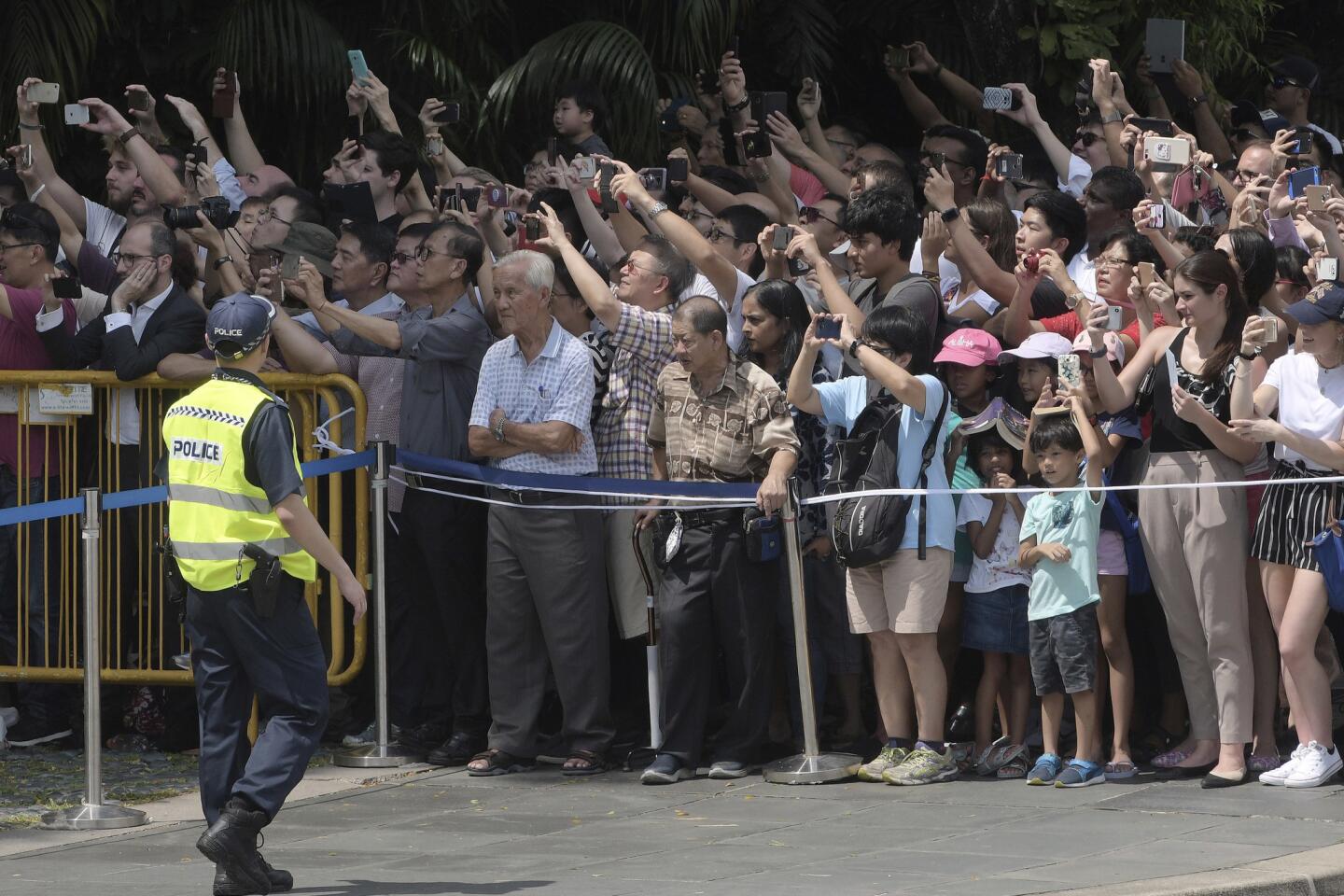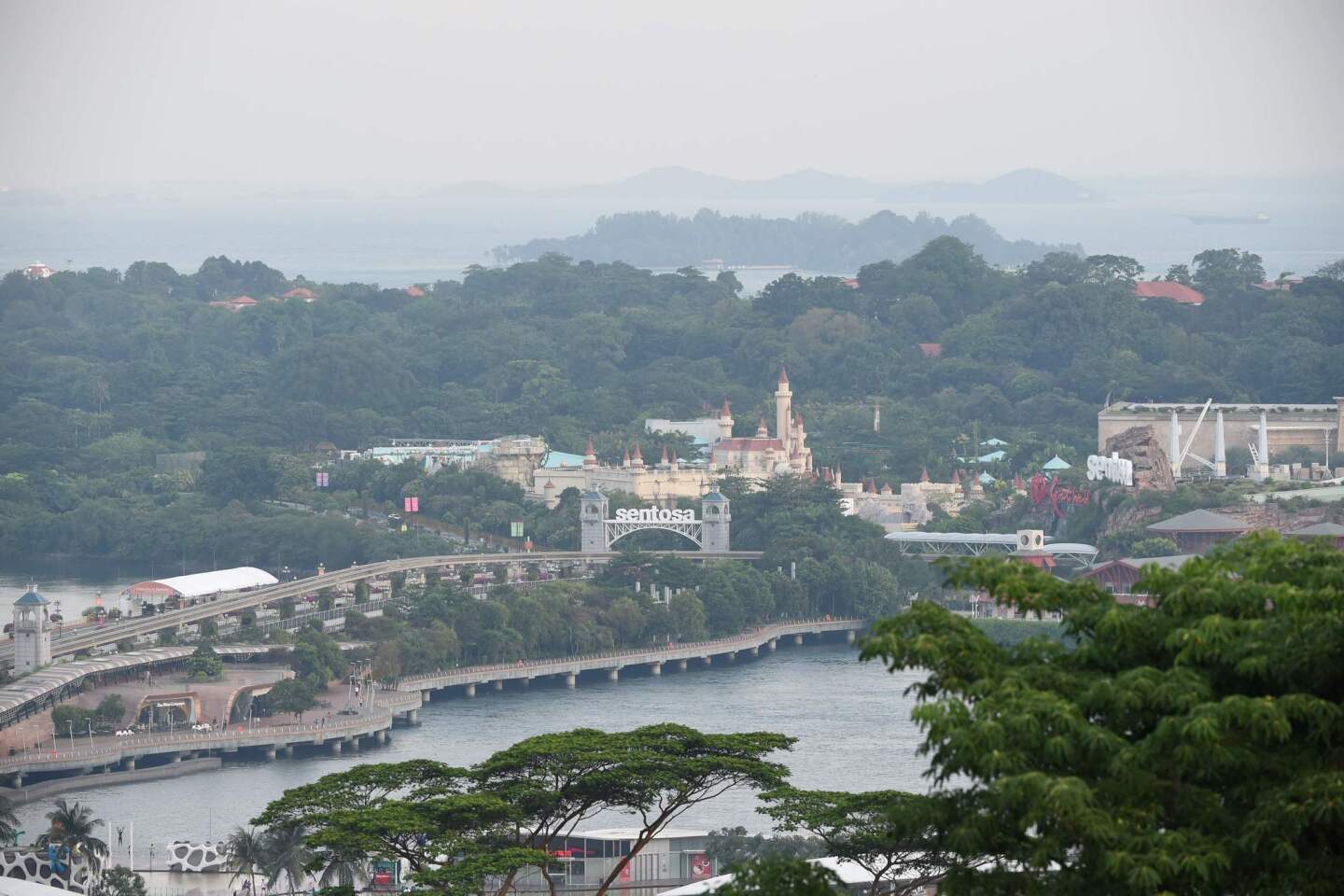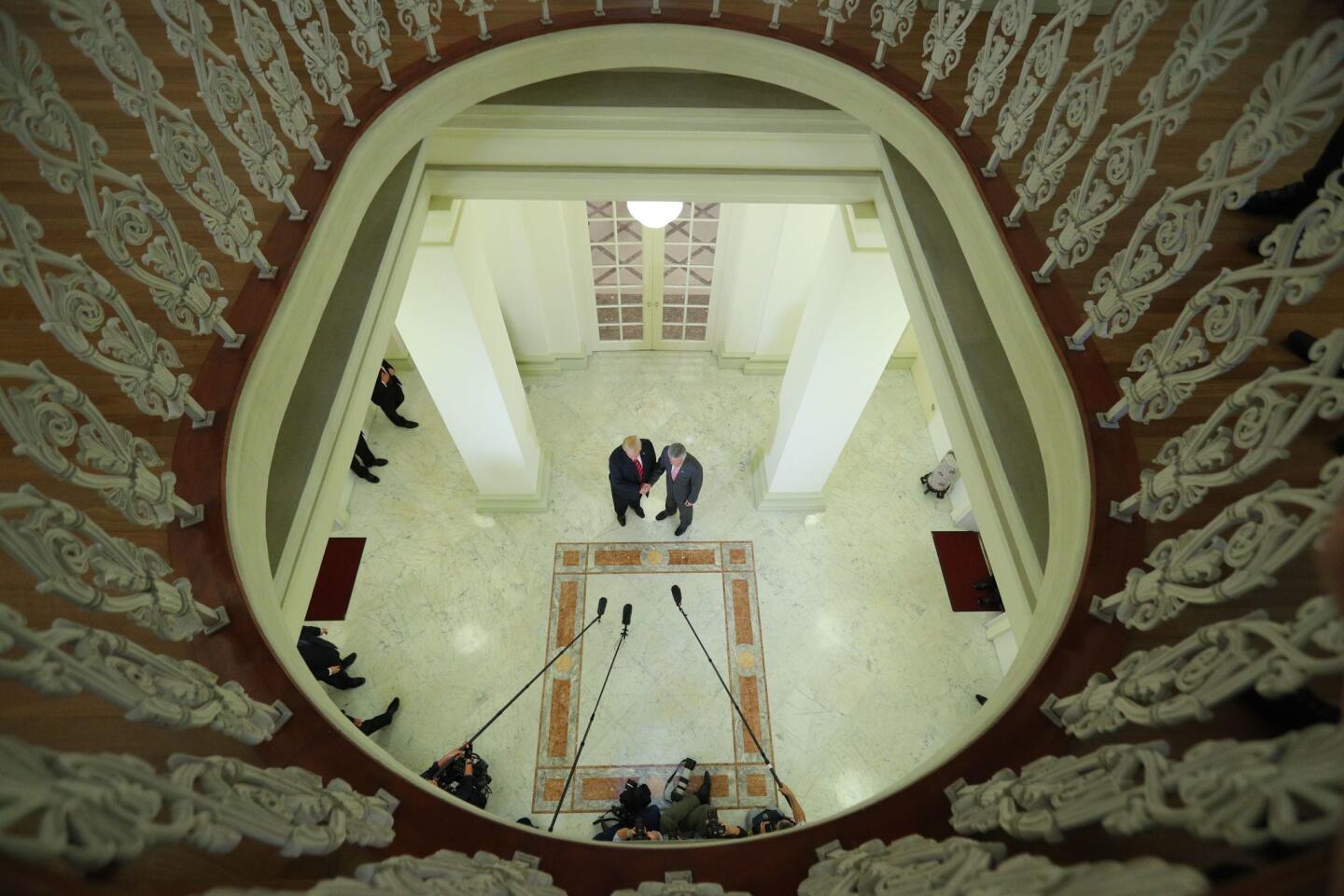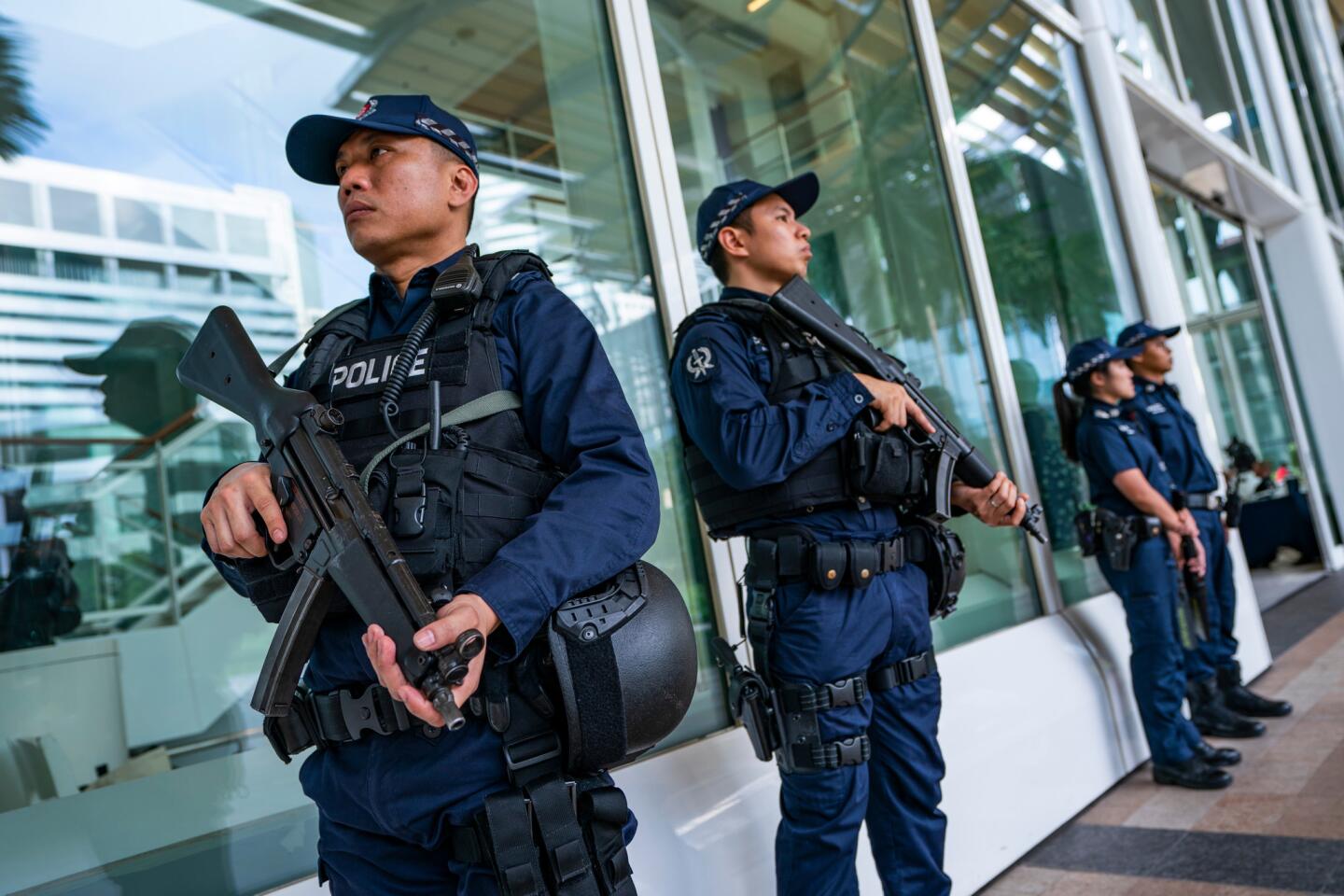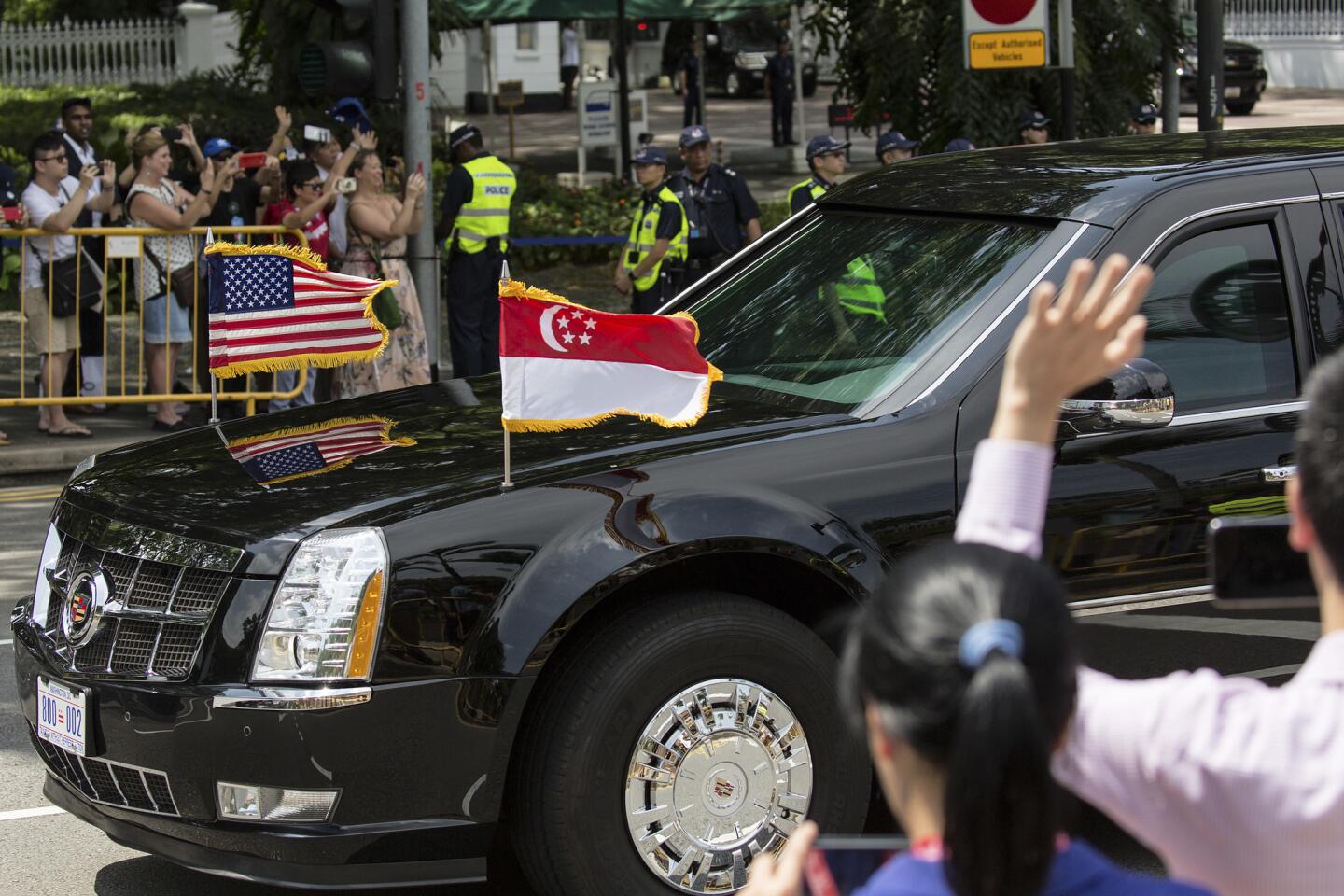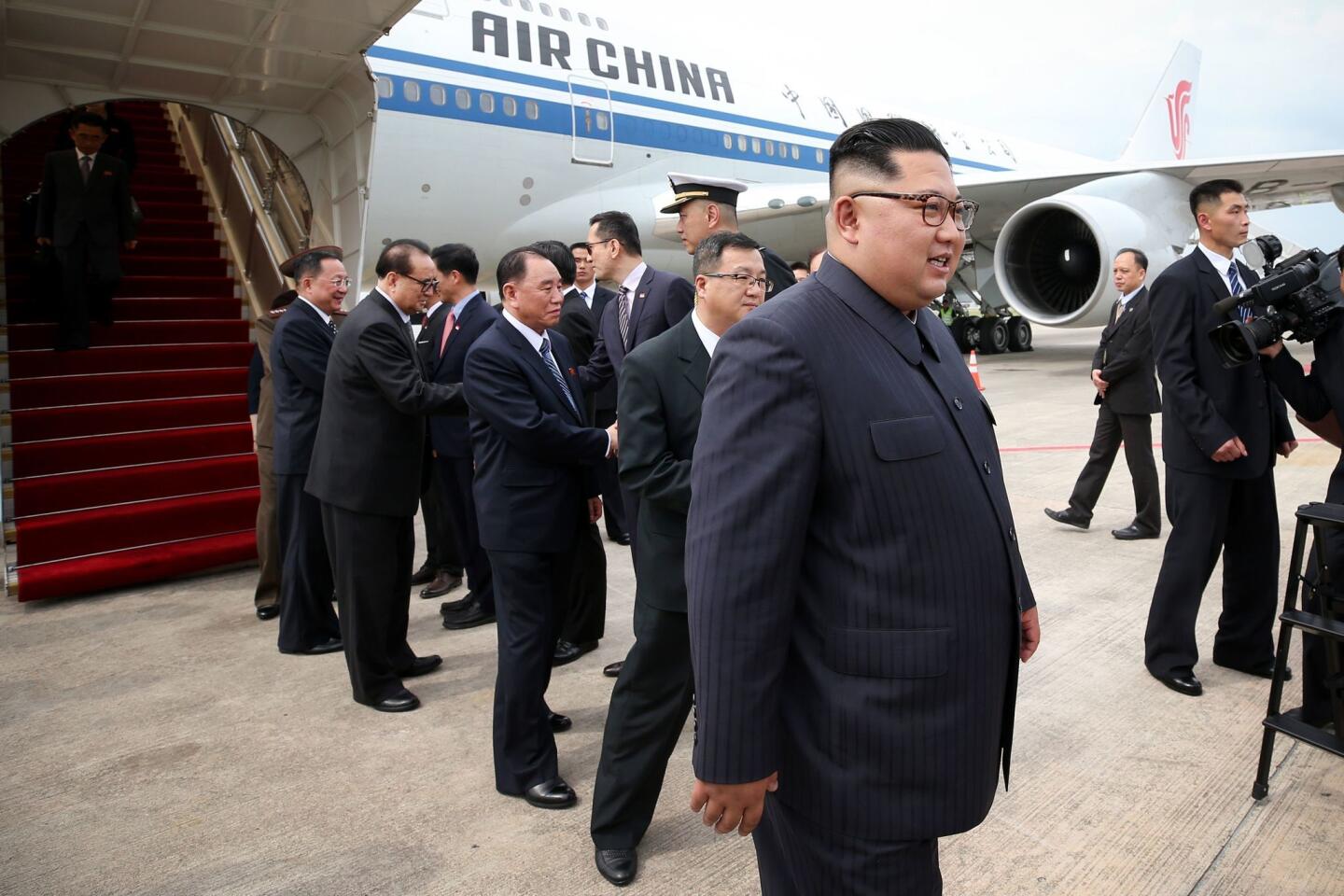Pompeo says Trump can offer North Korea security assurances unlike any in the past

Secretary of State Mike Pompeo dangled new security concessions on the eve of the nuclear summit. But he refused to say if Trump was considering withdrawing or reducing 28,000 U.S. troops from South Korea.
- Share via
Reporting from Singapore — On the eve of a historic meeting between President Trump and North Korean leader Kim Jong Un, Secretary of State Mike Pompeo dangled new security concessions while publicly downplaying expectations that the nuclear summit will lead to anything beyond future talks.
As senior U.S. and North Korean negotiators huddled all day in working-level talks, Pompeo highlighted the extraordinary nature of the rushed Singapore summit, which brings a mercurial U.S. president and an erratic North Korean dictator face to face for the first time to haggle over the apocalyptic threat of nuclear war.
“There are only two people that can make decisions of this magnitude, and those two people are going to be sitting in a room together tomorrow,” Pompeo told reporters here Monday.
The White House said the preliminary talks “have moved more quickly than expected” and that the summit, which will include a working lunch, would wrap up in one day. It said Trump will leave Singapore on Tuesday night rather than staying until Wednesday as originally planned.
Pompeo said Trump could go further than previous presidents in trying to make a deal, suggesting the president was willing to ease Kim’s concerns about America’s military posture and security guarantees to allies in northeast Asia as long as North Korea gives up its unconventional weapons.
“We’re prepared to take what will be security assurances that are different, unique than...[what] America has been willing to provide previously,” Pompeo said.
“We think this is both necessary and appropriate,” he said.
Pompeo refused to say if Trump was considering withdrawing or reducing the 28,000 U.S. troops from South Korea, but his language suggested an openness to realigning the U.S. military presence and operations in the region, a long held North Korean demand.
North Korea is also eager for the United States to lower its so-called nuclear umbrella, a shield that is guaranteed under longstanding defense treaties with South Korea and Japan in event of an attack from North Korea.
The U.S. foreign policy establishment considers an easing of the U.S. regional defense posture risky and highly inadvisable as long as North Korea maintains its nuclear, chemical and biological weapons, and a million-man army that mostly is deployed near the border with South Korea.
Security experts have warned that any pullback of U.S. forces would undermine decades of postwar alliances and allow China to accelerate its efforts toward regional dominance.
Pompeo said Trump phoned South Korean President Moon Jae-in and Japanese Prime Minister Shinzo Abe on Monday to update them on the fast-moving, last-minute developments before Tuesday’s summit.
Even as Pompeo floated the apparent U.S. concessions, he took a hard line on what the Trump administration would demand in return, He said economic sanctions would remain in place “until North Korea completely and verifiably eliminates its weapons-of-mass-destruction programs.”
If taken at face value, the full elimination of North Korea’s extensive storehouse of nuclear, chemical and biological weapons could take years, making the prospect a tough sell to Kim, given the crippling effects of Trump’s “maximum pressure” sanctions program on North Korea’s economy.
But Pompeo said Tuesday’s summit would quickly determine if Kim was serious about his offers to denuclearize, even though the two sides have never publicly agreed on what that would entail.
“North Korea has previously confirmed to us its willingness to denuclearize and we are eager to see if those words prove sincere,” he said.
Pompeo continued to downplay the possibility of an immediate accord between Trump and Kim, suggesting a successful outcome would simply be further engagement between Washington and Pyongyang.
“We are hopeful this summit will set the conditions for future fruitful talks,” he said, noting “there’s going to be a lot of work left to do.”
The discussions “will set the framework for the hard work that will follow. We’ll see how far we get, but I’m very optimistic that we’ll have a successful outcome from [Tuesday’s] meeting between these two leaders,” he added.
It was the latest scaling back of Trump’s initial soaring optimism for a speedy disarmament agreement, or a peace treaty to formally end the 1950-53 Korean War, once even suggesting that North and South Korea might want to hold a large celebration after he and Kim meet.
Instead, Pompeo made clear that the U.S. team was fully aware of the long record of failed negotiations with North Korea, usually after the U.S. side accused Pyongyang on cheating or failing to fulfill its promises to curb its nuclear or missile programs.
“The United States has been fooled before, there’s no doubt about it,” he said. “Many presidents previously have signed off on pieces of paper only to find out the North Koreans either didn’t promise what we thought they had or actually reneged on their promises.”
At his news briefing, Pompeo made no mention of human rights. Critics have urged Trump to demand that Kim reform his repressive government, which the State Department has accused of assassinating dissenters and jailing tens of thousands of prisoners to maintain its grip.
Pompeo spoke as Choe Son Hui, North Korea’s vice foreign minister, and Sung Kim, a U.S. envoy to the Philippines who led previous talks with Pyongyang, held working-level talks that lasted all day.
Their discussions appeared the final opportunity for the two sides to broker joint statements or draft possible agreements that Trump and Kim can present as tangible results from their summit.
Trump called Moon and updated him on the plans during a 40-minute conversation Monday afternoon. The South Korean president has been a driving force in Trump’s and Kim’s abrupt turn from bellicose rhetoric to sensitive diplomacy.
Moon told Trump a successful summit would be a “great present” not only for the world, but for Trump’s 72nd birthday on Thursday, Moon’s spokesman, Kim Eui-kyeom, told reporters in Seoul.
In public comments Monday, Moon continued to stroke the two leaders’ egos, a strategy he has used to defuse the clashes that repeatedly threatened to upend the summit.
He praised Trump and Kim for the “bold decisions” to hold a summit. “I hope it becomes a historic milestone going from war to peace,” he said.
In a separate call, Abe reaffirmed that Trump will raise North Korea’s past abductions of Japanese individuals, Japan’s Kyodo News reported.
The Japanese prime minister told reporters in Tokyo that “Japan and the United States, along with South Korea, have completely shared and agreed on the basic policy” for Tuesday’s summit.
Pompeo is scheduled to visit Seoul and Beijing after the summit concludes to brief South Korean and Chinese officials.
The White House said Trump and Kim will meet for about 15 minutes in private Tuesday morning, with only interpreters in the room, before bringing aides in for extended talks at the Capella Hotel on Sentosa Island, which lies just south of Singapore.
Their private meeting heightens the drama and unpredictability of an summit that has commanded the world’s attention. No sitting American president has ever met with a North Korean leader.
Traditionally, summits between heads of state follow months of lower-level meetings in which officials work out a deal, haggling over every clause and comma, while choreographing the interactions of the top leaders in advance.
This summit was proposed only three months ago and finalized less than two weeks ago after a tense period of roller-coaster will-they-or-won’t-they diplomacy.
The two sides did not put forward a public agenda as they made final preparations. Trump said Saturday that he expects to rely on his gut when he meets Kim and will know almost instantly whether they’re going to make a deal.
After arriving Sunday night, Trump had a light day on Monday: a meeting and lunch with Lee Hsien Loong, the prime minister of Singapore, followed by a visit with U.S. Embassy staff.
Trump arrived at Singapore’s presidential palace just before noon with a delegation that included Pompeo, Chief of Staff John F. Kelly, national security advisor John Bolton, White House Press Secretary Sarah Huckabee Sanders and Stephen Miller, a top advisor and speechwriter.
Trump shook hands with Lee in front of photographers before they walked into the lunch but did not respond to shouted questions either then or during a subsequent photo op.
“We have a very interesting meeting in particular tomorrow, and I think things can work out very nicely. But we appreciate your hospitality and professionalism and your friendship. Thank you very much,” Trump told Lee as they sat down for lunch.
Trump was presented with an early birthday cake at the lunch.
Trump has vacillated over his objectives for the meeting with Kim. At first he said he would accept nothing less than swift and permanent nuclear disarmament from North Korea.
More recently, he has allowed that the summit could start a longer process and that his meeting with Kim would be a “get to know you plus” with a reclusive adversary.
Pompeo, who has been Trump’s most influential advisor on North Korea, said the United States remains “committed to the complete, verifiable, irreversible denuclearization” of the Korean Peninsula.
That has long been official U.S. policy and represents a hard line that some advisors and outsiders have suggested could bend if Trump and Kim are able to reach a deal.
David Kang, a professor at at USC who heads its Korean Studies Institute, said he expects little of substance from the summit but that the diplomatic process still represents significant change for North Korea and the region.
“This is a photo op,” he said. “I predict Kim and Trump will get along fine. They have similar personalities.”
But Kang said a limited or loosely defined outcome is still better than the tension last summer, when Trump and the Kim were trading insults and threats of nuclear war.
His said the summit is also important, and potentially transformative, for Kim’s image in North Korea.
“My guess is that he has gone down a path of relative openness that will be hard to back away from,” Kang said. “So North Koreans themselves are in for a change.”
[email protected] | Twitter: @Noahbierman
UPDATES:
5:42 a.m: This story was updated to say summit will wrap up Tuesday and Trump will then leave Singapore.
4:45 a.m.: This story was updated with details from Secretary of State Mike Pompeo’s news briefing in Singapore.
2:45 a.m.: This story was updated with details of Trump’s phone call with South Korea’s president.
This story posted at 1:30 a.m.
More to Read
Sign up for Essential California
The most important California stories and recommendations in your inbox every morning.
You may occasionally receive promotional content from the Los Angeles Times.
